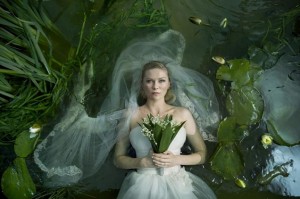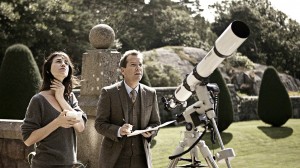MELANCHOLIA: 4 STARS
 Near the end of “Melancholia,” the latest film from professional crank Lars Von Trier, his star Kristen Dunst wonders aloud if anyone would grieve if the world was gone. It’s the great existential question in a film which may be the most audience friendly study of depression ever.
Near the end of “Melancholia,” the latest film from professional crank Lars Von Trier, his star Kristen Dunst wonders aloud if anyone would grieve if the world was gone. It’s the great existential question in a film which may be the most audience friendly study of depression ever.
Von Trier breaks the film into three portions. A montage of strange slow motion images and soaring symphonic music serves as a prologue. In its final image Von Trier lets us known how the story will end, establishing a tension that runs through every frame of the film.
Part One starts off happily enough with a young couple, Justine (Dunst) and Michael (Alexander Skarsgard), on the way to an opulent wedding reception at the home of (Charlotte Gainsbourg), Justine’s sister. Soon, however, it becomes apparent that all is not right. Justine’s inability to feel happiness and her family’s recriminations at the reception ruin the day.
Part Two shifts the focus to Claire. She is obsessed with the news that a newly discovered planet, Melancholia, may be making a bee-line to planet Earth. In this half Justine takes a more passive role as Von Trier explores Claire’s fixation.
I’ve kept the synopsis sketchy because the plot details are less important than the sense of gloom Von Trier builds slowly over the course of the movie’s 135 minute running time. From the haunting images of the prologue to Dunst’s gravely restrained performance the film creates slow grind suspense. It’s a disaster movie in which the end-of-the-world theatrics are secondary to the disastrous relationships on display.
Dunst has rarely been better, and Von Trier’s muse, Charlotte Gainsbourg, is a coiled spring of emotion, and even if they aren’t believable as sisters—they look and sound nothing alike—the strained relationship between them feels real.
They are the film’s centerpieces, and the best used of all the actors, although Udo Kier as a testy wedding planner steals a scene or two.
“Melancholia” is, undoubtedly, Von Trier’s attempt to visualize his very public struggle with depression. It’s a feel bad movie, heavy with symbolism—Justine literally bathing in the light of the oncoming destruction for example—and in no hurry to explain itself, but in its own claustrophobic, closed-down way is a naturalistic and compelling look at people in distress.

